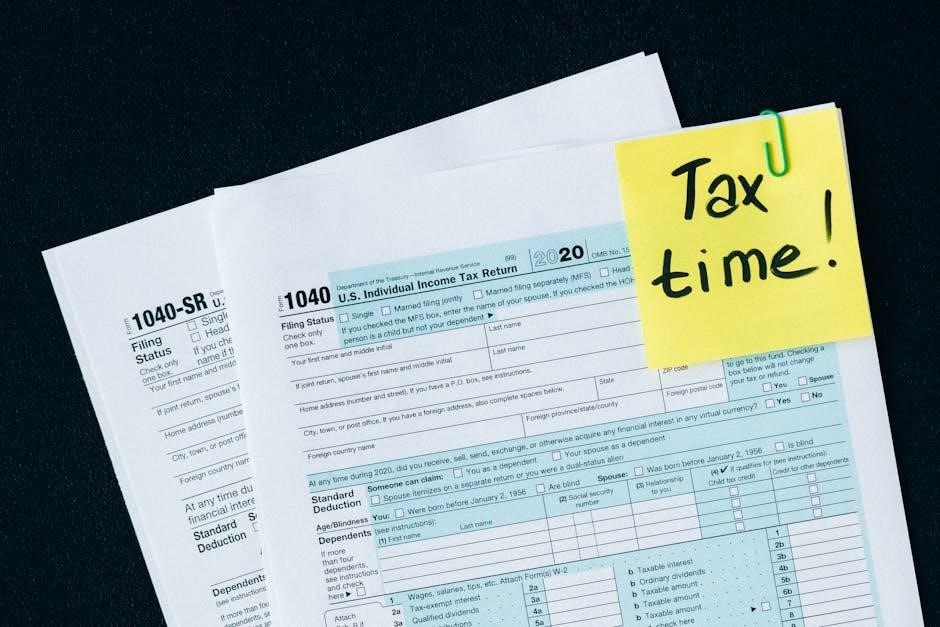Understanding the Alabama Privilege Tax
The Alabama Privilege Tax is an annual levy on businesses and entities operating in the state. It applies to corporations, LLCs, and other business entities. The tax is based on the entity’s net worth or income, depending on the type of business. Entities must file an Alabama Business Privilege Tax Return annually, accompanied by the appropriate fee. Compliance with this tax is crucial for maintaining legal business operations in Alabama. The tax rate varies, and exemptions may apply under certain conditions; Understanding the rules ensures accurate filing and helps businesses avoid penalties.
What is the Alabama Privilege Tax?
The Alabama Privilege Tax is an annual tax imposed on businesses and entities operating within the state. It applies to corporations, limited liability companies (LLCs), and other business entities. The tax is based on the entity’s net worth or income, depending on the business type. Entities are required to file an Alabama Business Privilege Tax Return annually, along with the associated fee. This tax is separate from income tax and is designed to grant the privilege of conducting business in Alabama. Recent updates, such as the 2023 full exemption for tax due of $100 or less, aim to simplify compliance for smaller entities.
Who is Required to Pay the Alabama Privilege Tax?
The Alabama Privilege Tax applies to all business entities operating in the state, including corporations, limited liability companies (LLCs), partnerships, and sole proprietorships. Non-profit organizations and exempt entities may also be required to file, depending on their income sources. Out-of-state businesses conducting activities within Alabama must comply as well. The tax ensures that all entities engaged in business activities contribute to the state’s revenue. Even entities with minimal income or those claiming exemptions must file the return, though some may qualify for reduced liability or exemptions under specific conditions.

Key Changes and Updates for 2023
The Alabama Privilege Tax saw significant updates in 2023, including a full exemption for tax due of $100 or less, simplifying compliance for small businesses. The minimum privilege tax increased to $125, with corporations also required to pay a $10 annual report fee. These changes aim to streamline filing processes and reduce burdens on smaller entities while ensuring fair revenue contributions. Businesses must stay informed to adhere to these updated regulations and take advantage of potential exemptions or reductions in liability.
Full Exemption for Tax Due of $100 or Less
For taxable years beginning after December 31, 2023, businesses in Alabama are fully exempt from the privilege tax if their tax due is $100 or less. This change aims to reduce administrative burdens on small businesses and individuals with minimal tax liabilities. Entities meeting this criterion are not required to file the Business Privilege Tax Return, simplifying compliance. However, they must still pay the $10 Secretary of State annual report fee. This exemption applies to corporations and other business entities, providing financial relief and streamlining the filing process for eligible parties.
Minimum Privilege Tax and Annual Report Fee
The minimum privilege tax in Alabama for 2023 is set at $100, ensuring that all businesses, regardless of size, contribute a baseline amount. Additionally, there is a mandatory $10 Annual Report Fee for corporations, which is separate from the privilege tax. This fee is required for filing annual reports with the Secretary of State. Together, these amounts ensure compliance with state regulations. The minimum tax and annual fee are essential for maintaining legal business operations in Alabama, with no exemptions for the annual report fee. Businesses must pay these by the designated deadline to avoid penalties and maintain good standing. The fees are structured to support state administrative functions and ensure fair contribution from all entities operating in Alabama.

Filing Requirements and Deadlines
The Alabama Business Privilege Tax Return must be filed annually by April 15th. Late filings may result in penalties. Ensure timely submission to avoid issues.
When to File the Alabama Business Privilege Tax Return
The Alabama Business Privilege Tax Return must be filed annually by April 15th. This deadline applies uniformly to all entities subject to the tax, including corporations and LLCs. Timely filing is crucial to avoid penalties and late fees. Extensions may be granted under specific circumstances, but interest on unpaid taxes accrues from the original due date. Late filing can result in penalties, so ensuring compliance with the April 15th deadline is essential for maintaining good standing with the state.
How to File: Online vs. Mail
The Alabama Business Privilege Tax Return can be filed online through the Alabama Department of Revenue’s website or by mail. Online filing is the preferred method, offering convenience and faster processing. To file online, visit the state’s tax portal, create an account, and submit the required forms electronically. For mail filing, download the forms from the website, complete them accurately, and send to the designated address. Both methods require timely submission to avoid penalties. Online filing is generally faster and more secure, while mail filing is available for those who prefer traditional submission.

Calculating the Alabama Privilege Tax
The Alabama Privilege Tax is calculated based on the entity’s net worth or income, with rates varying depending on the business type. The minimum tax due is $100, plus a $10 annual report fee for corporations. The tax rates are applied to the determined taxable income or net worth, ensuring accurate calculation for compliance.
How to Determine Your Tax Liability
To determine your Alabama Privilege Tax liability, start by calculating your taxable income or net worth, depending on your business type. For corporations, the tax is based on net worth, while other entities may use income. Apply the relevant tax rates, ensuring you account for any applicable exemptions or deductions. A full exemption applies if the tax due is $100 or less. Add the $10 annual report fee for corporations. Ensure accuracy to avoid penalties and maintain compliance with state regulations. Proper documentation and calculations are essential for correct liability assessment.
Tax Rates Based on Income
Alabama Privilege Tax rates vary based on income levels. For taxable incomes up to $2,500,000, the tax rate is 1.75% per $1,000. Incomes exceeding $2,500,000 are taxed at 1.75% plus an additional 0.25% for each $1,000 over the threshold. The minimum privilege tax is $100, with a $10 annual report fee for corporations. Lower-income entities may qualify for exemptions, reducing liability. Accurate calculation of income and applicable rates ensures correct tax assessment. Proper documentation and adherence to state guidelines are essential for compliance and avoiding penalties.

Exemptions and Deductions
Certain entities, such as non-profits and government organizations, are exempt from the Alabama Privilege Tax. Tax due of $100 or less is fully exempt, with a $10 annual report fee for corporations. Deductions may apply for specific expenses, reducing taxable income. Proper documentation is required to claim exemptions or deductions, ensuring compliance with state tax regulations and minimizing liability effectively.
Entities Exempt from the Alabama Privilege Tax
Certain entities are exempt from the Alabama Privilege Tax, including nonprofit organizations, government agencies, religious institutions, and educational establishments. Specifically, 501(c)(3) organizations, public schools, and churches qualify for exemption. Additionally, entities with a tax liability of $100 or less are fully exempt, though a $10 annual report fee applies to corporations. Exemptions are based on the entity’s purpose and structure, ensuring tax relief for qualifying organizations. Proper documentation and compliance with state requirements are essential to claim these exemptions effectively.
Deductible Expenses and Credits
Businesses may deduct ordinary and necessary expenses related to operations when calculating Alabama Privilege Tax liability. Specific deductions include salaries, rent, and cost of goods sold. Credits are also available, such as the Small Business Tax Credit for qualifying entities. Additionally, the Rural Development Credit may apply to businesses operating in designated areas. It is essential to maintain accurate records and consult official state resources for detailed lists of eligible deductions and credits to ensure compliance and maximize tax savings under Alabama law.

The Filing Process
The Alabama Business Privilege Tax Return must be filed annually, with options to submit online or by mail. Gather required documents, ensure accuracy, and meet deadlines to avoid penalties.
Step-by-Step Guide to Completing the Return
Start by gathering necessary documents, including financial statements and tax identification numbers. Access the Alabama Business Privilege Tax Return form online or by mail. Fill in business details, income, and deductions accurately. Calculate tax liability using provided instructions. Apply any applicable exemptions or credits. Pay the tax online via secure payment portals or by mailing a check. Review the return for errors before submission. Ensure compliance with deadlines to avoid penalties. Retain a copy for your records. Seek professional help if needed to ensure accuracy and compliance with state regulations.
Required Documentation and Attachments
Ensure you have all necessary documents to complete the Alabama Business Privilege Tax Return accurately. Gather financial statements, including balance sheets and income statements. Attach Schedule AL-CAR if reporting capital assets. Include federal tax returns (e.g., Form 1120 or 1065) and supporting schedules. Provide documentation for any exemptions or credits claimed. Attach a copy of your payment voucher if paying by check. Verify all attachments align with the return to avoid processing delays. Retain copies of submitted documents for your records.
Penalties and Late Filing
Failure to file or pay the Alabama Privilege Tax on time results in penalties. Late filing fees and interest on unpaid taxes apply. Penalties increase with time if tax remains unpaid or return is late.
Consequences of Late Payment or Non-Filing
Failure to pay or file the Alabama Privilege Tax on time results in penalties, including late filing fees and interest on unpaid taxes. Additional penalties may apply if the return is late or incomplete. Late payment can lead to loss of good standing with the state, affecting business operations. Persistent non-compliance may result in legal action or revocation of business privileges. Ensuring timely payment and accurate filing is essential to avoid these consequences and maintain compliance with state regulations. Penalties increase over time, so addressing issues promptly is crucial.

How to Avoid or Appeal Penalties
To avoid penalties, ensure timely filing and payment of the Alabama Privilege Tax. Double-check return accuracy and use the online filing system for efficiency. If penalties are assessed, review the notice carefully and provide required documentation to support your case. Businesses may appeal penalties by contacting the Alabama Department of Revenue within specified deadlines. Addressing issues promptly helps mitigate further consequences. Understanding the appeal process and seeking assistance from tax professionals can also aid in resolving disputes effectively and maintaining compliance with state tax requirements.
Compliance and Record-Keeping
Maintaining accurate records is essential for compliance with the Alabama Privilege Tax. Businesses must keep detailed documentation to support tax filings and ensure timely payment. Proper record-keeping helps prevent penalties and ensures adherence to state regulations. Annual reports and tax returns must be submitted accurately to avoid legal consequences. Staying informed about tax updates and deadlines is crucial for maintaining compliance. Failure to comply may result in penalties, emphasizing the importance of thorough documentation and adherence to filing requirements.
Best Practices for Maintaining Records
Maintaining accurate and organized records is crucial for compliance with the Alabama Privilege Tax. Businesses should keep detailed financial statements, tax-related documents, and annual reports. Organize records both physically and digitally, ensuring easy access. Implement a retention policy to store records for at least three years, as audits may require historical data. Regularly back up digital files to prevent data loss. Ensure all documentation aligns with state regulations and tax requirements. Consulting with tax professionals can provide additional guidance for complex record-keeping needs.
Importance of Accuracy in Reporting
Accuracy in reporting is critical for compliance with the Alabama Privilege Tax. Incomplete or incorrect filings can lead to penalties, delays, or audits. Businesses must ensure all financial data, tax calculations, and submissions are precise. Double-checking figures and adhering to state guidelines minimizes errors. Accurate reporting also helps maintain transparency and trust with regulatory bodies. Inaccuracies can result in additional fees or legal consequences. Prioritizing precision ensures smooth processing and avoids complications, making it essential for businesses to dedication time and resources to accurate reporting practices.

Additional Resources and Support
- Visit the official Alabama state website for forms and detailed instructions.
- Download the Alabama Business Privilege Tax Return form online.
- Contact state support for personalized assistance and clarifications.
Where to Find Forms and Instructions
To obtain the necessary forms and instructions for the Alabama Privilege Tax, visit the official Alabama Department of Revenue website. Navigate to the “Forms” section, where you can download the Alabama Business Privilege Tax Return (Form BIT-1). Additionally, detailed instructions and guides are available to help with filing. Use specific keywords like “Alabama Business Privilege Tax Return” in the search bar for quick access. For further assistance, contact the Alabama Department of Revenue directly via phone or email for personalized support. Ensure compliance by referring to the most recent updates and resources provided on the state website.
Contact Information for State Support
For assistance with the Alabama Privilege Tax, contact the Alabama Department of Revenue. Call their customer service at (334) 242-1170 or visit their office at 50 North Ripley Street, Montgomery, AL 36104. You can also submit inquiries via email through the “Contact Us” section on their official website. Additionally, the Alabama Secretary of State’s office provides support for business-related filings at (334) 242-7200. Reach out to these offices for help with tax-related questions, ensuring accurate and timely filing of your business privilege tax return.